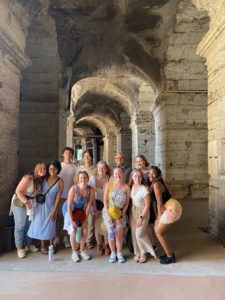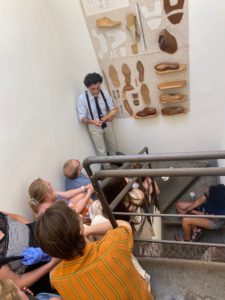In ISE you have two study abroad options to choose from:
IE493: Applied Human Factors and Art in Florence
3 credit hours, Mini-term Summer 2023 May 18-June 7


This course will be conducted over three weeks in Florence, Italy, the heart of Tuscany and birthplace of the Renaissance, with several day trips, and a 4-day trip to the ancient capital city of Rome.
The course interweaves an understanding of how and why to apply Human Factors principles to improve work and life, gained through the study of Italian manufacturing, products, and living space, with an examination of how the human form and daily life has been represented in various art forms over history.
In the course of the mini-term, we will complement lessons and discussions with guest lectures, facility tours, cultural immersion activities, artistic study, and appreciation of Italian life.
Students will:
- Develop and enhance Human Factors/Safety knowledge while building practical experience applying theory to solve workplace, design, and human interaction challenges.
- Gain exposure to these methods in European culture, primarily through instructor-designed content, guest lectures, cultural excursion, and facility visits.
- Incorporate the study of how the understanding and presentation of the human form and ‘workspace’ (anthropometrics and ergonomics) have changed over history, as presented in various artforms.
The course is composed of 5 topical modules related to the application of human factors, one group project, and a reflective paper.
Contact Professor Knight with any questions at laknight@utk.edu and to get on the initial list.
Click on the photo below to find out more information:
IE 495 (3 credits)
Reliability and Business Excellence
June 10 – July 1, 2023 / Summer – 1st Session


STUDENT LEARNING OUTCOMES:
This course is a “big picture” look at things that students need to know about taking all that has been learned to-date and putting it to practice in a business environment at any industry. It integrates engineering knowledge and concepts with things that need to be understood in real world situations to enable continuous improvement & success. Several companies will be toured to support learning and discussion.
Upon course completion, specific questions that students will be able to answer are:
What role has engineering played in innovations and progress?
What is operational excellence? How do you attain it?
What’s the difference between reliability, maintainability, lean mfg., TPM, RCM, Six Sigma, and other tools and techniques and how do they fit together? …and when to use what?
What do the best companies do differently?
What is the impact of size, volume, complexity on operational excellence?
What are the elements of a successful continuous improvement process and how do you implement/sustain it?
What is the role of leadership and individuals?
How does improved reliability impact safety, equipment uptime, quality, culture and cost?
If you spend a day at a factory, how do you know if it’s efficient and effective?
Book used/3 week syllabus: The Relativity of Continuous Improvement by
Dr. Klaus Blache
Dr. Blache has done several of these trips to Germany and Austria and is very familiar with Europe (including Zurich).
Contact Dr. Blache with any questions at kblache@utk.edu and to get on the initial list.